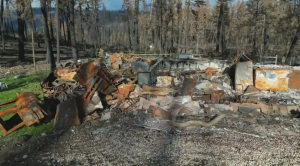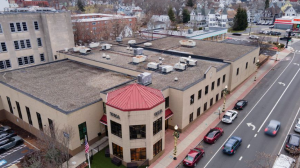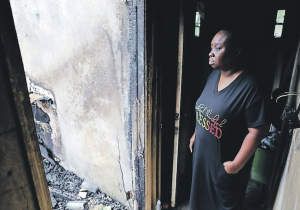
By Glenn Thrush
A large, disorganized system was revealed by an inspector general. He described moldy bread, rodent droppings, and leaking roofs.
Inspectors from the Justice Department’s internal watchdog showed up unannounced in Tallahassee in Florida in May expecting to see serious issues endemic in other crumbling and understaffed Bureau of Prisons facilities.
They were shocked by what they found: moldy food on trays at lunch, insects and rodents crawling all over breakfast cereal, bathroom tiles that had cracked or been removed, mold growing everywhere, roofs with leaks covered with plastic bags to stop the rain from coming in, and windows with feminine hygiene products blocked out of fear.
According to the report of the inspector general, the inspection revealed “serious operations deficiencies” in the Federal Correctional Institution (FCI), a Tallahassee low-security facility that holds about 750 female prisoners. “The most alarming were its food storage and service operations,” the report stated.
Conditions are extreme, and they represent the worsening of the crisis in the Prisons Bureau. It operates over 120 prison facilities. Most of the facilities need major repairs, and they are having difficulty retaining employees because private jobs pay more and have less stress.
The report provided a glimpse into a massive, dysfunctional system, which is meant to ensure sanitary and safe conditions.
Michael E. Horowitz said, “It’s stunning,” in a recent interview.
This assessment is part of an intensive program that covers three or four prisons per year. It provides a snapshot, though small, of the conditions faced by around 160,000 prisoners and 40,000 employees. The team of Mr. Horowitz found structural issues at the women’s federal prison in Waseca (Minn.) between January and February.
We do regular systemic reviews, but have started using an unannounced program of inspections to observe what is really happening, every day, to the staff and inmates, Mr. Horowitz stated.
He added that the initial aim of inspections was to improve individual conditions. The warden at Tallahassee filled the vacant supervisor position within the Food Preparation Division, and began to clean up the storage area, kitchen, and other areas of the facility during the inspection team’s visit.
The larger goal appears to be gaining support from lawmakers in order to increase the budget of the Prison Bureau. This money will be used to repair the prison’s structure and to compensate workers for taking mandatory overtime, or neglecting administrative tasks to cover shifts due to a lack of corrections officers.
Colette Peters, Director of the Bureau of Prisons in her testimony before a House Judiciary Committee subcommittee this week, lauded the recent improvements made by the Bureau of Prisons to retain employees. She said, however, that staffing levels were only half what was needed in certain departments of some 120 prisons, particularly in the medical unit.
Unmet infrastructure requirements are also dire at the Bureau. Ms. Peters stated that her team is surveying 300+ prison buildings run by the Bureau, and she estimates $2 billion needed to clean up the backlog.
She told the committee that the Bureau has been receiving an average of $100 million in annual appropriations to make repairs and modifications.
According to a spokeswoman from Ms. Peters, the Bureau would “carefully assess and implement any corrective measures necessary to ensure our mission to operate safe, secure and compassionate facilities is continued to be met.”
Horowitz said that one of the biggest problems at Tallahassee was the fact that the $2 billion wish list for repairs did not include fixing roofs in the ramshackle buildings from the 1930s. Inspector General’s Investigators discovered that five of the buildings that housed prisoners were in need of new roofs. Many window, bathroom and shower fixtures had leaking problems that caused staff and prisoners to stuff them with whatever textiles and paper they could find.
The problems were a lot worse in the dining area, kitchen and warehouse.
The investigators discovered bags of staple foods like pasta and soy, piled up in a haphazard manner near an opening on the wall that allowed insects, rats and mice to freely roam. Rodent feces were scattered among and on top of the food that was destined to be placed in trays. Boxes had been chewed and opened. Plastic bags that contained cereal were infested with insects.
The contents of jars and cans was leaking or warped. The cafeteria was also in disrepair. Many of the plastic chairs attached to the tables were broken, leaving jagged stumps. This made it uncomfortable for people to sit and could have been used as a weapon. The windowsill of the dining room was covered in hundreds of dead insects that no one bothered to remove.
Problems were well known but they weren’t addressed. A survey by the Bureau in June 2022 revealed that 55 percent of the prisoners rated the quality of their food as poor and said they were served “outdated” foods.
Tallahassee’s bathrooms and ventilation system were in disarray as well. The inspector’s team reported that many of the ventilation grilles on cinderblock walls had fallen or were pried loose, creating an unsafe situation and serving as cubbies to store contraband.
The report cites interviews conducted with staff and states that the contraband, mainly cigarettes, vapes, and cell phones, flowed freely and openly into the facility.
The most visible of these was the inmate sanitation teams who collected garbage in bags in public areas outside the women’s prison and the adjacent detention center for men. They were then screened upon reentering prison.
Often, their bags were not.
The investigators noted that “During our visit, we observed inmates entering through the main gate without their garbage being screened.”
Mold removal is essential for maintaining an indoor healthy environment. Mold remediation involves thorough inspections and safe mold removal. Mold removal and restoration will ensure that mold is removed effectively, thus reducing the risk of health problems and further damage to property. To stop mold from spreading, you must take swift and thorough action. If you are interested in getting better information and finding out in more detail about the services we offer, you can see more here Imperial Restoration mold remediation and restoration Toronto. This will preserve your property and its integrity as well as the health of those who live there. Mold remediation experts not only help restore your home, but they also give you peace of mind knowing your environment is safe and mold-free.





